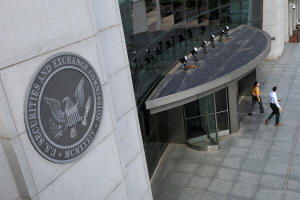SEC's in-house enforcement powers at risk in US Supreme Court case
 Send a link to a friend
Send a link to a friend
 [November 28, 2023] By
Andrew Chung [November 28, 2023] By
Andrew Chung
(Reuters) - A challenge to the U.S. Securities and Exchange Commission's
powers to protect investors from fraud comes before the Supreme Court on
Wednesday in another in a series of legal attacks against federal
agencies that regulate financial markets.
The justices are due to hear arguments in an appeal by President Joe
Biden's administration of a lower court's ruling restricting the SEC's
power to enforce securities laws through the agency's longstanding
in-house tribunal system. The case involves hedge fund manager George
Jarkesy, who the SEC fined and barred from the industry after
determining he had committed securities fraud.
Critics of the agency have argued that its in-house system gives it the
unfair advantage of prosecuting cases before its own judges rather than
before a jury in federal court.
The New Orleans-based 5th U.S. Circuit Court of Appeals in 2022 ruled in
favor of a legal challenge brought by Jarkesy. The 5th Circuit decided
that the SEC's power to seek penalties through in-house enforcement
proceedings violates the U.S. Constitution's Seventh Amendment right to
a jury trial and infringes on presidential and congressional powers.

The case could make it harder for the SEC weed out bad actors in the
securities industry, legal experts said. The stakes are even higher
because a separate challenge to an industry-financed "self-regulatory
organization" called FINRA, the Financial Industry Regulatory Authority,
is working its way through lower courts.
The SEC and FINRA challenges are supported by conservative and business
groups, which have complained about the regulatory reach of the federal
"administrative state" in areas such as energy, the environment, climate
policy, workplace safety and financial regulation.
"The danger is that if you take away the ability of FINRA and the SEC to
efficiently remove misconduct and miscreants, you're going to have
misconduct linger a lot longer," University of Nevada, Las Vegas
securities law professor Benjamin Edwards said.
"Our financial system ultimately runs on trust, and you have to be able
to trust that the people you're working with are operating honestly -
and having a vigorous enforcement structure in place is pretty
important," Edwards added.
The SEC, which enforces various U.S. laws that protect investors, has
faced a series of legal attacks even as the Supreme Court, with its 6-3
conservative majority, has signaled skepticism toward expansive federal
regulatory power.
The court in 2018 faulted the way the SEC selected its in-house judges,
and in April made it easier for targets of agency actions to mount
challenges in federal court.
The justices also are set to decide in the coming months whether the
Consumer Financial Protection Bureau's funding structure conforms with
the U.S. Constitution and could overturn a decades-old precedent that
helps federal agencies defend regulatory actions in court.
[to top of second column] |

People exit the headquarters of the U.S. Securities and Exchange
Commission (SEC) in Washington, D.C., U.S., May 12, 2021.
REUTERS/Andrew Kelly/File Photo

BARRED FROM THE INDUSTRY
The SEC in 2011 began investigating Jarkesy, who founded two hedge
funds with his Houston-based investment advisory firm, Patriot28
LLC. The funds had about 120 investors and roughly $24 million in
assets under management.
The SEC charges against Jarkesy and his firm proceeded before an
in-house judge. The agency upheld the judge's findings that Jarkesy
and his firm violated the Securities Act of 1933 and other laws
including by misrepresenting the identity of the funds' auditor and
value of the holdings.
The agency ordered them to pay a $300,000 civil penalty and
Patriot28 to disgorge nearly $685,000 in ill-gotten gains, while
barring Jarkesy from the securities industry.
The 5th Circuit tossed the SEC's decision against Jarkesy. In
addition to its conclusion about the right to a jury trial, the 5th
Circuit found that the SEC wielded too much power in choosing
whether to bring cases in-house or in federal court, and that job
protections for its administrative judges make them too difficult to
remove, infringing on presidential powers under the Constitution.
The FINRA case - a constitutional challenge to its structure brought
by Utah-based Alpine Securities Corp - is currently before another
federal appellate court and eventually could come to the Supreme
Court.
Under federal law, securities brokers and dealers generally must
become FINRA members and are subject to its rules and disciplinary
measures. FINRA calls itself a "private, not-for-profit
corporation."
Alpine, facing a disciplinary proceeding that would expel it from
the industry, claimed that FINRA wields government power and
therefore must be subject to the Constitution's provisions,
including presidential oversight of its officers. FINRA has said the
suit poses an "existential threat" to the organization.

UCLA School of Law corporate law expert James Park said frustration
has grown in the business community as the SEC has routinely imposed
fines on various defendants.
"I think they think the SEC and, perhaps, FINRA to some extent have
in a sense gotten too aggressive because ... there are very few
checks on their discretion in the current system," Park said.
(Reporting by Andrew Chung; Editing by Will Dunham)
[© 2023 Thomson Reuters. All rights
reserved.]
This material may not be published,
broadcast, rewritten or redistributed.
Thompson Reuters is solely responsible for this content. |